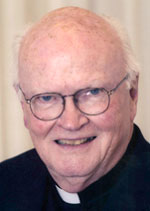Here’s a story to assist your preparation for the September 2015 World Meeting of Families, which will welcome Pope Francis to Philadelphia and stimulate worldwide discussion of Catholic family values.
This is not a religious story nor were its principals, both Catholics, religious professionals. In fact, one was a playwright; the other an actress.
When the young newspaperman and aspiring playwright Charles MacArthur was courting (we would now call it “dating”) the young actress, later to become known as the first lady of the American theater, Helen Hayes, he bought a bag of peanuts from a street vendor and, with a great flourish, handed the bag to her saying, “I wish they were emeralds.”
Many years later, as he was dying, she came to his bedside one day and he surprised her with an emerald bracelet saying, “I wish they were peanuts.”
[hotblock]
Helen Hayes and Charles MacArthur enjoyed a long and happy married life together, despite difficulties. And through it all, they managed to keep their values and valuables in perspective. They had their peanut days and their emerald days as they built a lasting marriage.
When I first heard that story, I thought it was just a beautiful legend, but I later had the opportunity to meet Helen Hayes personally and asked her if the story was true. She assured me that it was.
It says it all so neatly and well: how important it is to keep family values free of corrosive materialism. In our advanced, technologically sophisticated and affluent society, there is poverty, of course, but there is also sufficient material abundance to constitute a threat to all families, even those of modest means, of becoming possessed by their possessions.
The virus of materialism can strike any marriage. Awareness of that possibility can function as protection of the marriage. And the experience of peanut days, not just during courtship and the early days of marriage, but later as well, can help strengthen the bonds of love between husband and wife, and between spouses and their children.
Even without the benefit of a deathbed perspective, the believing Catholic, the man or woman of the Beatitudes, can figure out what is really important in life and act accordingly.
In anticipation of the 2015 World Meeting of Families, a “preparatory catechesis” has been published under the title “Love Is Our Mission: The Family Fully Alive.” It is hoped that all of us will read it and reflect on its lessons.
It purports to explain “what Catholics believe about human purpose, marriage and the family,” and it relates this belief in 10 chapters under the titles: “Created for Joy,” “The Mission of Love,” “The Meaning of Human Sexuality,” “Two Become One,” “Creating the Future,” “All Love Bears Fruit,” “Light in a Dark World,” “A Home for the Wounded Heart,” “Mother, Teacher, Family: The Nature and Role of the Church,” and “Choosing Life.”
It would be great if the discussion this document hopes to stimulate will generate a few more peanuts-and-emeralds stories that can inspire an outlook that will strengthen contemporary family life.
PREVIOUS: Nonviolence as the ultimate path to peace
NEXT: Making sure our words and actions help, not hurt




This is a wonderful story and the planned “Love Is Our Mission: The Family Fully Alive” catechesis sounds wonderful too. But both seem focused primarily on existing marriages and families which I believe is only one part of the problem today. The decline in actual new Catholic marriages is also important. The trends today seem to favor co-habitation, the delay of having marriage and having children, and societal and psychological pressure against more than one or perhaps two children. A strategy to reach Catholic singles and show them the wonder of a good Catholic marriage and a family with children is sorely needed. Just my two cents.
D.,
You make a very good point that we need to reach the young, especially those on the fence regarding marriage and children. However it seems to me that the “strategy” to reach them might actually circle back to the situation of current families and what is laid out in the catechesis regarding pastoral care for all, not just married people. The family unit is deeply wounded right now and we need to know how to repair it while providing pastoral care and support to those who currently need it in our Catholic “Family” Then hopefully if we can begin to restore the Catholic family then that will provide the Christian witness that is necessary to reach the young and hopefully instill those same values in them. I hope that makes sense. At least that’s how I see things, for what it’s worth.
God bless.